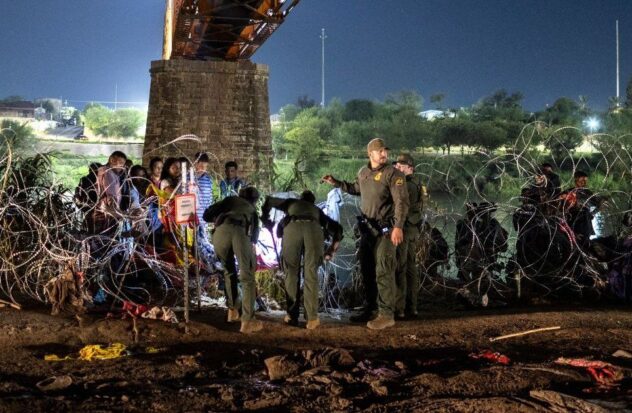The Congress of Oklahoma quickly passed a bill this week creating the new crime of “impermissible occupation” and passed it to the governor to sign into law. The new crime carries penalties of up to two years in prison for being in the state irregularly.
Oklahoma is one of several states that are maneuvering to tighten immigration control as the crisis continues on the southern border due to the wave of migrants crossing illegally into US soil.
Here are some things to know about the latest initiatives in several states to address the issue of immigration:
What is happening in Texas?
Oklahoma lawmakers followed the lead of Texas, where Gov. Greg Abbott signed a bill last year that would allow the state to arrest and deport people who enter the United States illegally. Abbott argues for national security reasons and accuses Biden of not acting to protect the border.
The law in Texas is currently on pause while the 5th U.S. Circuit Court of Appeals weighs a challenge brought by the federal Department of Justice.
Opponents say the law is the most drastic attempt by a state to control immigration since an Arizona law created more than a decade ago, parts of which the U.S. Supreme Court struck down.
What does Arizona law contemplate?
Oklahoma law would make it illegal to remain in the state without legal permission, and a first offense would be considered a misdemeanor and could be punishable by up to a year in jail. Offenders would be required to leave the state within 72 hours of their release. A second and subsequent offense would be a felony punishable by up to two years in prison.
State Senate President Pro Tem Greg Treat, who introduced the proposal in the upper chamber, expressed frustration with the Biden administration and Congress for not taking more definitive steps to resolve the immigration problem.
“The federal government has failed. The federal Congress… has done nothing to have an impact on it,” Treat, a Republican, said. “So what can we do? We can say you have to be legally in Oklahoma.”
Outside the state Capitol, more than 100 people gathered Tuesday to oppose the bill.
Sam Wargin Grimaldo, 36, a lawyer from south Oklahoma City whose mother emigrated from Mexico in 1979, called on protesters to register to vote and become more involved in politics.
Grimaldo said many Latinos in Oklahoma are afraid of the new law.
“We feel attacked,” said Grimaldo, who was wearing a T-shirt that said: “Young, Latin and proud.”
“People are afraid to leave their homes if a bill like this is proposed and then approved,” he added.
What are other states doing?
The governor of Tennessee, Bill Lee signed a law that requires law enforcement agencies to contact federal immigration authorities if they find people who are in the country without permission, and forces them to cooperate in the process of identifying, detaining and deporting them. The law goes into effect on July 1. Another proposal in the state would increase prison sentences up to life in prison for those who are in the United States irregularly and commit a violent crime.
An Iowa, Republican Gov. Kim Reynolds signed a bill into law this month that has parts similar to the Texas law. Another approach to developing a bill similar to the Texas law is advancing in Louisiana. And Idaho legislators were considering a similar initiative, but adjourned without approving it.
The legislators of Georgia approved a bill that seeks to force jailers to verify the immigration status of inmates, part of a political response to the murder of a nursing student on the University of Georgia campus, allegedly committed by a Venezuelan.
Last month, Florida Governor Ron DeSantis signed a law to increase prison sentences for migrants who are in the United States without authorization if they are convicted of serious crimes or driving without a license.
What happens now?
Like the new Texas law, many of the bills are almost certain to face court challenges because immigration is a federal, not state, issue in the U.S. Constitution, said Kelli Stump, an immigration attorney at Oklahoma City and president-elect of the American Immigration Lawyers Association.
“This whole thing is a mess and the system doesn’t work, but the Constitution says that the states should handle state affairs and the feds handle federal affairs,” Stump said. “In the long run, this will end up before the Supreme Court, if I have to bet anything.”
In six months of the current fiscal period, the Office of Customs and Border Protection (CBP) records a total of 1,733,496 encounters of migrants.
Source: With information from AP





